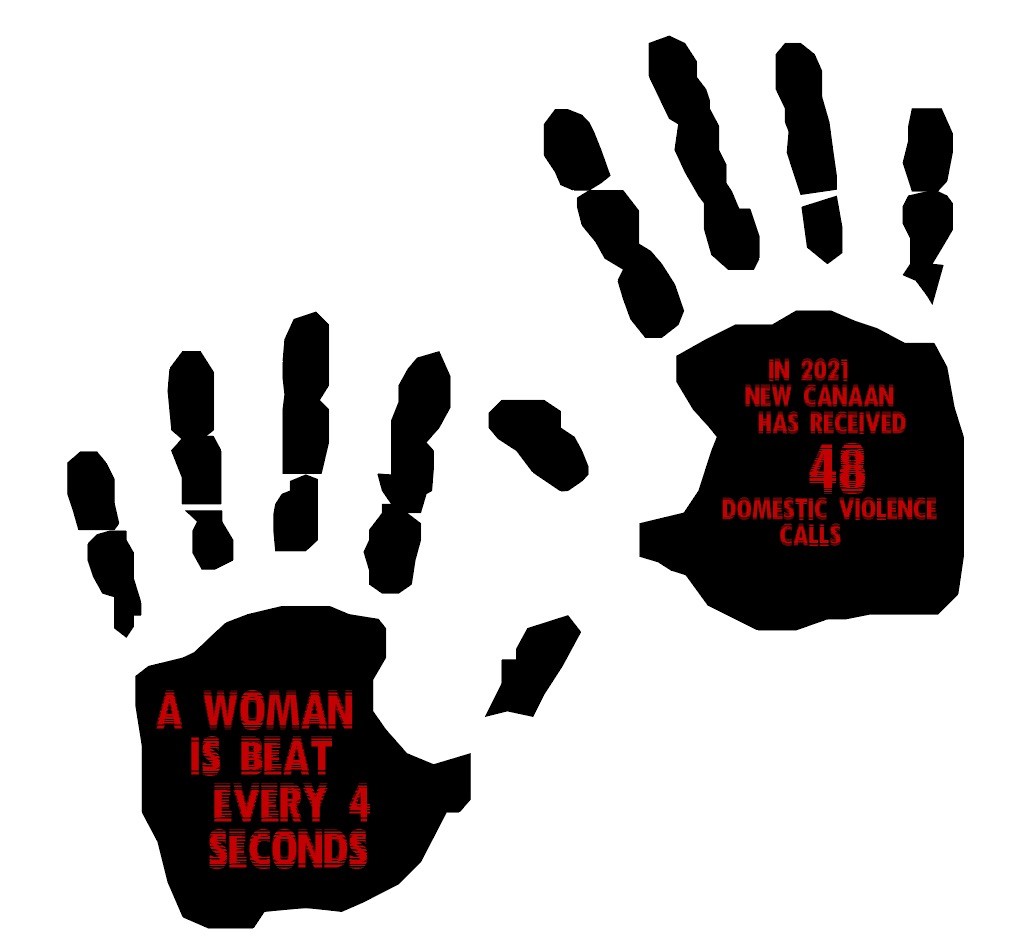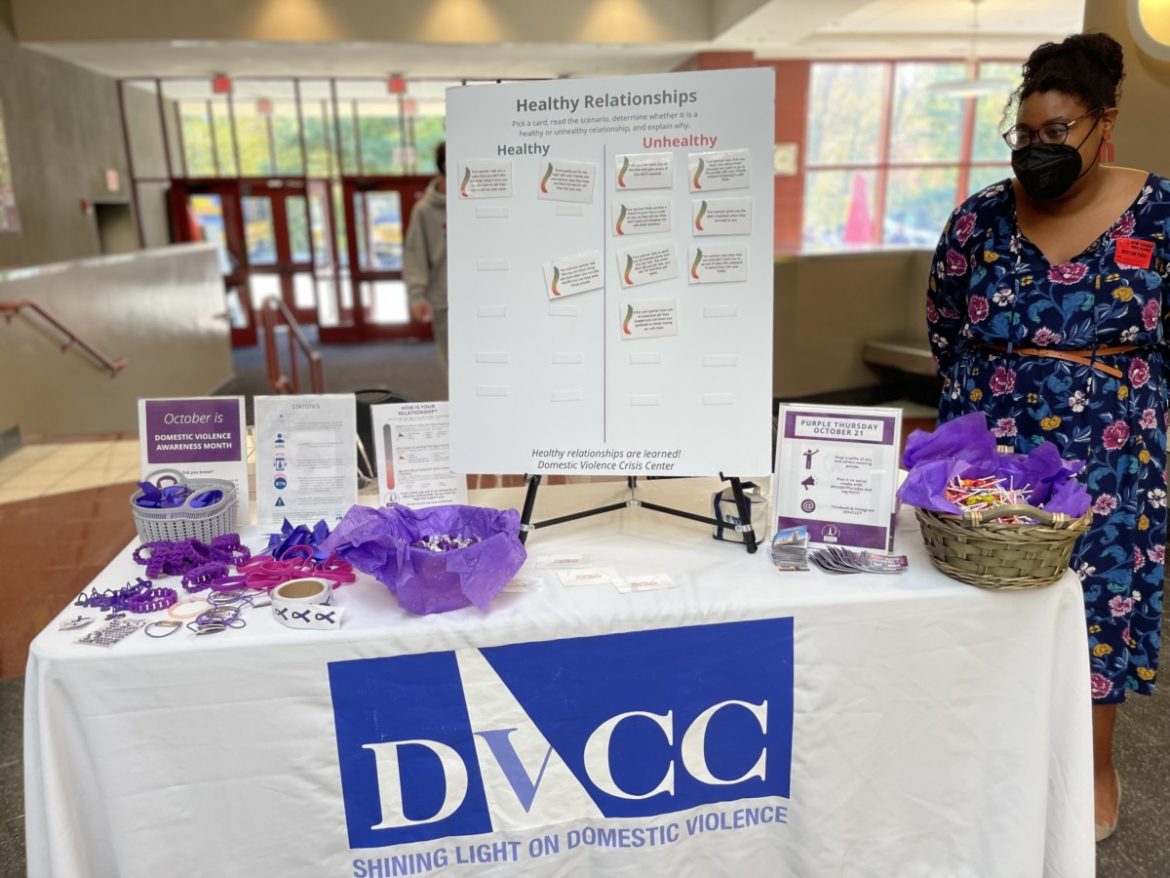Kate Hunter, Editor-in-Chief
@khuntercourant
Inside the pristine white picket fences of New Canaan, it’s difficult to imagine a crime hidden inside homes, bedrooms, and children’s phones. Yet, so far in 2021, the New Canaan Police Department has responded to a total of 48 domestic violence calls. Each year, on October 1st, the high school assistant principal, Ari Rothman, reads a proclamation on this issue in front of the school to recognize the start of Domestic Violence Awareness Month.
“Domestic violence is a pattern of repeated behaviors that are used to maintain power and control over another individual,” said Associate Director of the Domestic Violence Crisis Center, Ann Rodwell-Lawton. “It can be within family relationships, within intimate partner relationships and also teen dating relationships..”
“One type of domestic abuse is physical, which is what we usually think of, but this can also include the fear of physical violence,” Ms. Rodwell-Lawton said. “Something that’s really common with teens is reckless driving. For example, an abuser locks a victim in a car and drives recklessly. That would be physical abuse because it is an intense fear of physical harm. ”

Physical abuse prompts law enforcement to take action. “An arrest is made in a domestic violence case when there is violence, like pushing or shoving,” said New Canaan Police Chief Leon Krolikowski. “We can get court intervention and monitoring in place so that people can get counseling. Arrests also mitigate violence from occurring in the future.”
That being said, the first thing victims of domestic violence should do is call for help, but oftentimes it’s difficult to do so.
“A lot of people think it’s embarrassing,” Chief Krolikowski said. “People believe that it is going to get better and by calling the police they are victimizing themselves. They just want things to go back to normal. People don’t want their neighbors to see the police pull up to their house and they don’t want their significant other to get arrested and have their picture in the paper. But if a situation arises to the level of domestic violence and the person being abused calls the police, hopefully, that will stop the violence altogether.”
However, the scope of domestic abuse extends far beyond the physical injury that typically prompts arrests. “Domestic abuse can include verbal abuse, which is using words to hurt someone,” Ms. Rodwell-Lawton said. “Treating a partner like a possession is a form of abuse. This includes extreme jealousy and victim-blaming.”
Emotional abuse has proven to be the most difficult for victims to heal from. “Victims start to believe what their abuser is saying to them,” Ms. Rodwell-Lawton said. “If someone is told every day that they are worthless, they might eventually start to believe that. Emotional abuse really impacts and damages someone’s self-esteem.”
It is important that individuals are aware of relationship “red flags”. “One of the most common red flags is isolation,” Ms. Rodwell-Lawton said. “Isolating someone from family and friends cuts an individual off from their support network and activities or things that they used to do. Number two, I would say extreme jealousy, if an individual is exhibiting behaviors of extreme jealousy or possessiveness that is another red flag. Constantly testing someone or checking in on someone is another red flag. This can lead to someone not having their own independence.”
Furthermore, self-assessment is key in any relationship. “The number one thing to ask yourself should be ‘is there is respect and equality in the relationship,’” Ms. Rodwell-Lawton said. “There might be an imbalance of power, or one person making the decisions. Maybe one person always has to be right or one person always has to have the final word. The other person could then feel that they are less important than the other person. These would all be things for people to look at and say ‘Is this an unhealthy relationship that I am in?’”.
While the severity of domestic violence may seem daunting, education on this issue is crucial to high school students. “I think it’s important to raise awareness of domestic violence,” Assistant Principal Ari Rothman said. “It is very much a high school issue. Not just in terms of kids and parents, but also in dating relationships.”
There are a plethora of resources available to students who witness or endure domestic abuse. “Every resource is available to help any student navigate or deal with any kind of situation,” Mr. Rothman said. “It’s not just the counselors and the administration to help deal with things, but also the social workers and psychologists. Due to confidentiality, we refer students to outside counseling and make recommendations to community agencies that deal with this more than people realize.”
To teenagers, it is important to bring domestic violence discussions to light. “If we don’t have conversations with high school students about what a healthy relationship looks like, what they feel like, and what they are, then they might never know,” Ms. Rodwell-Lawton said.




